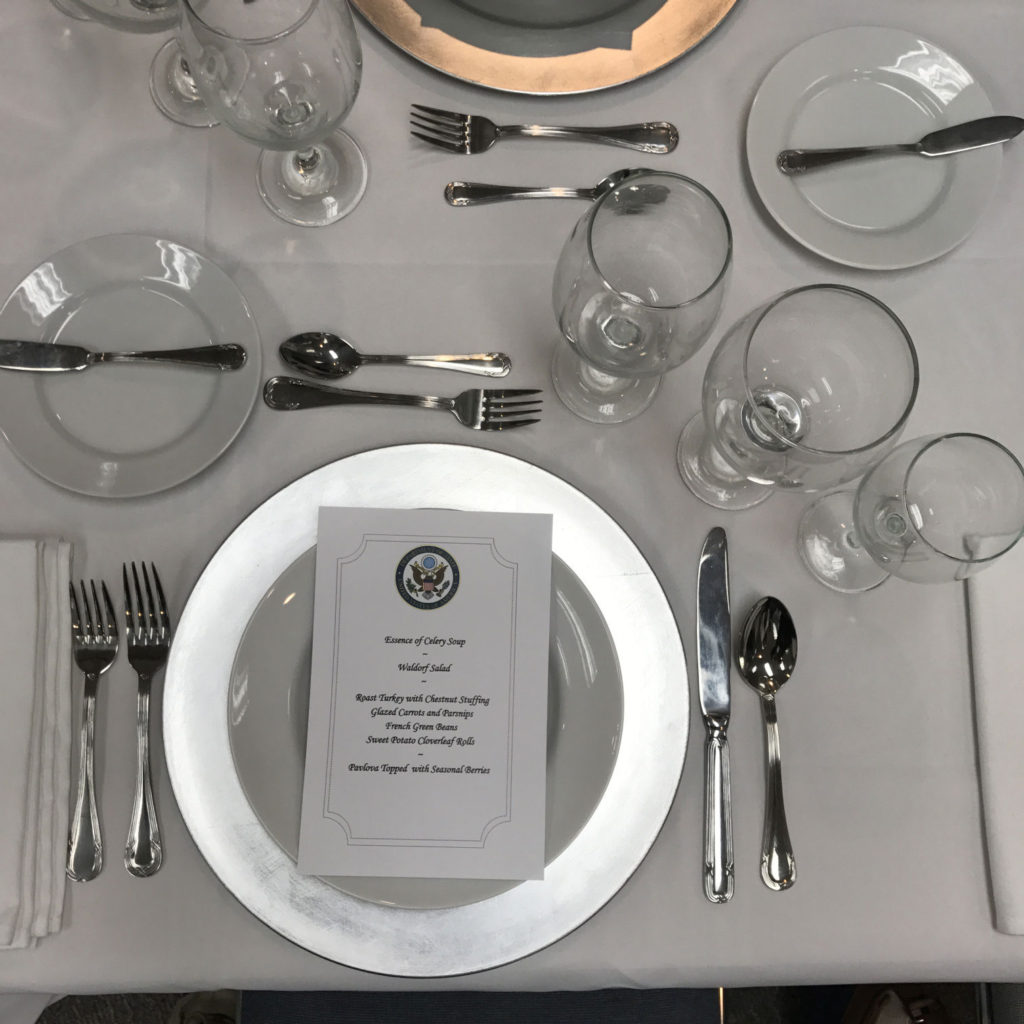Pushing cookies, but not perpetuating a myth.
The reality is that this job is a lot more like a day in the DMVÂ than an evening at Downton Abbey.
There is a stereotype of diplomats as “pin-striped cookie pushers from Harvard.” Here’s a good summary of the ways that phrase has been used over the past 50+ years. Most of the time the phrase has been used, it has been in an attempt to dispel the stereotype. However, there is a lingering (false) impression of what we do as foreign service officers.
Some people have the (very wrong) opinion that diplomats don’t do “real” work. We are seen as people who just go to cocktail parties (for the record, I have never been invited to a cocktail party), or sit around drinking tea and eating cookies (OK, that has happened, but I was standing, not sitting, it was very hard work, and there is a very good reason that I did it).
This weekend my wife and I took an elective class on diplomatting according to protocol. The formal name of the course is “Protocol and US Representation Abroad.” The course was a fascinating exploration of protocol. We covered topics such as to how to shake hands (eye contact, firm but not-too-firm grip, two to three pumps, then release). And the physical mechanism of exchanging business cards (and the very important uses of business cards). And how to address government officials at various levels in the hierarchy.
Here’s a quiz: how should you address a US ambassador? True or false: “Your Excellency” is the appropriate form of address for our ambassador. For the answer, refer to “Title of Nobility” clause in Article I, Section 9, Clause 8 of the United States Constitution. Spoiler alert: the correct answer is: “false.”
I know from experience that the so-called “cookie pushing” events (we call them “representational events”) are incredibly useful and efficient. They are a forum where we can make contacts with foreign government counterparts. In one hour, I can meet a dozen or so different people who work in various local government ministries. Later, when I need information to help US citizens in trouble, or figure out a way to work with the local government to further US interests, I know who to contact. Of course, I’m not important enough to make treaties or prevent a war from breaking out. At my level, my task is more likely to be contacting a local university in order to arrange a visa talk for students.
But regardless of the level that this interaction happens, and the consequences that these relationships have on international relations, the principle is the same. We have to know people in order to be effective diplomats. And meeting someone in a social atmosphere is more conducive to forging a good working relationship.
Here is one example of the importance of a good working relationship with a foreign government at the local level. American citizens who are jailed in foreign countries are entitled, under the Vienna Convention, to regular visits by US Consular officers. It’s not hard to imagine that a prison official in a small city in a developing country would not be aware of his obligation, under the Vienna Convention of 1963, to allow us to visit a US citizen in his jail. When we encounter resistance, we can pick up the phone, call the local government official who we invited to a recent representational event, and ask him to make a phone call to the warden of the jail. This happens very often. Because we have an existing relationship with the local government, we can resolve the situation quickly and without unpleasantness, and we can check up on the well-being of the jailed US citizen.
That’s the value of representational events. We make contacts, network with the community, and lay the groundwork for doing our job of serving the American people more efficiently.
A fun part of the class was learning how to plan and host a formal dinner party. Elements of the task included planning the menu, arranging the seating chart, setting the table, making toasts. During the table setting task, the instructor played the theme song to “Downton Abbey.” I’m not making that up.
I confess that I have not hosted any formal dinner parties yet in my career. My idea of hosting dinner is making a big pot of chili (with plenty of kidney beans), then inviting anyone within shouting distance to come over and help me eat it. But it’s possible that in the future (if I’m ever important enough for it to matter)Â I will have to hold a diner like this. I’m not holding my breath, though. It’s a lot more likely that I will be invited to fill a seat for a last-minute cancellation (by someone much more important than I am) to someone else’s party. When/if that happens, I will know enough not to humiliate myself and embarrass the host.

I did this. And now I know what every utensil and glass is for. Do you?
There are a lot of resources for learning the fine points of diplomatic protocol. In fact, you can read our handbook: “Protocol for the Modern Diplomat,” which is available online.
Finally, I want to emphasize that this course is optional for diplomats. The formal dinner party very, very small element of our job, which is to help and support for US citizens and to further US interests abroad. Sometimes that means eating cookies at a tea party, but most of the time it’s a lot less glamorous. Most of the time it’s a lot more like working for the DMV. This part of the course was just an opportunity to prepare ourselves for the one or two chances that we get every year to interact in a more formal setting.